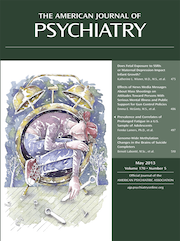The Dutch Bipolar Offspring Study: 12-Year Follow-Up
Abstract
Objective
Offspring of bipolar parents have a genetically increased risk of developing mood disorders. In a longitudinal study, the authors followed a bipolar offspring cohort from adolescence into adulthood to determine the onset, prevalence, and early course of mood disorders and other psychopathology.
Method
The Dutch bipolar offspring cohort is a fixed cohort initiated in 1997 (N=140; age range at baseline, 12–21 years). Bipolar offspring were psychiatrically evaluated at baseline and at 1-, 5-, and 12-year follow-ups. Of the original sample, 77% (N=108) were followed for the full 12 years.
Results
Overall, 72% of the bipolar offspring developed a lifetime DSM-IV axis I disorder, 54% a mood disorder, and 13% bipolar spectrum disorders. Only 3% met DSM-IV criteria for bipolar I disorder. In 88% of the offspring with a bipolar spectrum disorder, the illness started with a depressive episode. In total, 24% of offspring with a unipolar mood disorder developed a bipolar spectrum disorder over time. Mood disorders were often recurrent (31%), were complex (comorbidity rate, 67%), and started before age 25.
Conclusions
Even after 12 years of follow-up, from adolescence into adulthood, bipolar I disorder was rare among bipolar offspring. Nevertheless, the risk of developing severe and recurrent mood disorders and other psychopathology was high. Future follow-up of this and other adult bipolar offspring cohorts is essential to determine whether recurrent mood disorders in bipolar offspring reflect the early stages of bipolar disorder.



